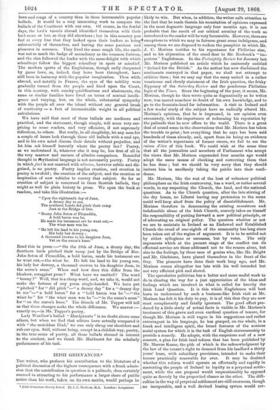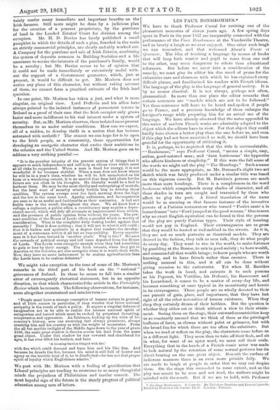IRISH GRIEVANCES.* THE writer, who prefaces his contribution to the
literature of a political discussion of the highest consequence with a frank admis- sion that the contribution in question is a palinode, does certainly succeed in attracting to his performance a larger share of public notice than his work, taken on its own merits, would perhaps be
• Irish Grierances Shortly Slated. By J. C. Morison, M.A. London: Longmans
likely to win. But when, in addition, the writer calls attention to the fact that he reads therein his recantation of opinions expressed in the most dogmatic language only four months ago, it is not probable that the result of our critical scrutiny of the work so introduced to the reader will be very favourable. However, there are exceptions to which we may in fairness grant some indulgence, and among them we are disposed to reckon the pamphlet in which Mr. J. C. Morison testifies to his repentance for Philistine sins,
and to his abjuration of the creed dear to Mr. Roebuck's " im- perious" Englishman. In the Fortnightly Review for January last Mr. Morison published an article which he ominously entitled "Ireland for the British." As the author has now disclaimed the
sentiments conveyed in that paper, we shall not attempt to criticize them ; but we may say that the essay united in a rather wearisome and cloudy statement of the Irish question, the frisky
flippancy of the Saturday Review and the ponderous Philistine logic of the Times. Since the beginning of the year, it seems, Mr.
Morison, though he then wrote quite as dogmatically as he writes now, was moved somehow to doubt of his own knowledge, and to go to the fountain-head for information. A visit to Ireland an& a few weeks' study of the subject have so radically altered Mr. Morison's opinions, that he is impressed, in our opinion even excessively, with the importance of redeeming his reputation by the palinode that he now offers to the world. There is a great deal of sound sense in the observations that Mr. Morison has taken
the trouble to print ; but everything that he says has been said hundreds of times already, and, apart from its being an evidence of the writer's repentance of former errors, we fail to see the raison d'etre of this book. We could wish at the same time that all the journalists and members of Parliament who accept the views that Mr. Morison expounded four months ago would
adopt the same means of checking and correcting them that he has done ; but we should be very sorry that they should imitate him in needlessly taking the public into their confi- dence.
Mr. Morison, like the rest of the host of volunteer political philosophers on the Irish controversy, has a word, or rather several words, to say respecting the Church, the land, and the national questions. As to the Church question, after the late stirring of the dry bones, no Liberal having any pretension to the name could well keep aloof from the policy of disestablishment.
Morison therefore in denouncing the existing monstrous and indefensible abuse of the Irish Church, scarcely takes on himself the responsibility of putting forward a new political principle, or of advocating an original policy. The question whether or not we are to maintain in Ireland as an Endowed and Established Church the creed of one-eighth of the community has long since been taken out of the region of argument. It is to be settled not by either syllogisms or sarcasms, but by votes. The only arguments which at the present stage of the conflict can do effectual service are those addressed not to the reason alone, but also to the feelings, by those men of genius who, like Mr. Bright and Mr. Gladstone, have placed themselves in the front of the fray. The pioneers have done their work long ago, and Mr. Morison comes altogether too late with his well intended but not very efficient pick and shovel.
The speculative politician has a better and more useful work to do in clearing the way for a just appreciation of the ideas and
feelings which are involved in what is called for brevity the Irish Land Question. It is this which Englishmen will best learn to understand by such a business-like Irish visit as Mr, Morison has felt it his duty to pay, it is of, this that they are now most complacently and fatally ignorant. The good effect pro- duced by a little study of actual facts is visible in Mr. Morison's. treatment of this grave and even cardinal question of tenure, for though Mr. Morison is still vague in his suggestions and rather extravagant in his language, he has grasped, on the whole, in a frank and intelligent spirit, the broad features of the noxious social system for which it is the task of English statesmanship to provide a remedy. He adopts, with the suspicious zeal of a new convert, a plan for Irish land reform that has been published by Mr. Marcus Keane, the pith of which is the acknowledgment by the law of the tenant's right to demand from his landlord a thirty years' lease, with subsidiary provisions, intended to make their tenure practically renewable for ever. It may be doubted whether this reform would operate as effectually and rapidly in converting the people of Ireland to loyalty as a perpetual settle- ment, while the one proposal would unquestionably be opposed quite as fiercely by the propertied classes as the other. The diffi- culties in the way of perpetual settlement are still enormous, though no insuperable, and a well devised leasing system would cer-
tainly confer many immediate and important benefits on the Irish farmers. Still more might be done by a judicious plan for the creation of a peasant proprietary, by the purchase of land in the Landed Estates' Court for division among the occupiers. Mr. H. D. Davies has lately published a small pamphlet in which the details of such a plan, founded in the main
on strictly commercial principles, are clearly and ably worked out. A Company for the purchase and sale of Irish Estates, combining
the system of deposits common in Building Societies and a life assurance to secure the interests of the purchaser's family, would be a novelty ; but Mr. Davies seems to be of opinion that it could not be made immediately or extensively useful with- out the support of a Government guarantee, which, just at present, it would be difficult to get. Mr. Morison does not notice any plans of this character, but without taking account of them, we cannot form a practical estimate of the Irish laud question.
In one point, Mr. Morison has taken a just, and what is more singular, an original view. Lord Dufferin and his allies have always pointed to the isolated instances pf permanent tenure in Ireland as a proof of their case that the Irish occupier only grows lazier and more indifferent to his real interest under a system of security. But, as Mr. Morison observes, these isolated cases present themselves to us under unfair conditions. How can we expect, all of a sudden, to develop thrift in a nation that has become saturated with unthrift ? The utmost we can hope for is to open to the Irish people, as a community, those opportunities for developing an energetic character that excite their ambitions in the colonies and the United States. And Mr. Morison goes on to adduce a very striking parallel :-
"It is the peculiar iniquity of the present system of things that it -appears to mark independence and self-help as odious vices which must at all risks be suppressed. When a man is fined for energy, it is not wonderful if he becomes slothful. When a man does not know whore • he will be in a year's time, whether he will be loft unmolested on his farm or a wandering outcast, it is no marvel that deep-laid plans for the future are not often in his thoughts. He literally would be a fool to harbour them. He may be the most thrifty and enterprising of mortals, but the fatal want of security utterly forbids him to develop those .qualities. The system sweeps over the land, mowing down the high and the low to the same level. Apathy, sullenness, and incompetence are seen to be as useful and fashionable as their contraries. A bad and Gable tone is the result throughout the class. We all know how a college, a regiment, a public office, a constituency may acquire a depre- .ciated morale, which will defy all attempts at improvement from within, and the presence of public opinion from without, for years. The pre- sent condition of the House of Lords offers a parallel which is worthy of consideration. What is the complaint daily waxing louder against that assembly ? That it does nothing ; that it will not do what it still could ; that it is listless and apathetic to a degree that renders the develop- ment of a statesman within it all but an impossibility. Every superior man in it has been trained in another place.' Why is this ? Because tho rewards of political energy and toil have departed from the House of Lords. The Lords wore energetic enough when they had something to gain or lose by their energy. The Irish tenants, when thoy get to America or the Colonies, are also energetic when it is worth their while. Now, they have no more inducement to be zealous agriculturists than the Lords have to be zealous debaters."
We might take exception to the tone of some of Mr. Morison's remarks in the third part of his book on the " national" grievances of Ireland. In these he seems to fall into a similar error of extravagantly rhetorical statement, but in an opposite direction, to that which characterized the article in the Fortnightly Review which he recants. The following observations, for instance, seem altogether overstrained and mischievous :-
"People must have a strange conception of human nature in general, and of Irish nature in particular, if they wonder that bitter national antipathy is the result of such a policy. It argues a singular dulness of imagination not to be able to realize the intense national spirit of antagonism and hatred which must be evoked by perpetual thwarting, compression and oppression. An Irishman, looking up the vista of his country's history, sees one recurring fact always prominent, always crushing him and his country as with the weight of mountains. From the all but mythic twilight of the Middle Ages down to the year of grace 1868, the same great shadow is thrown across his land from the same great object. Under this shadow he has cowered and shuddered for ages, it has ever filled his horizon, and been
'A looming bastion fringed with fire,' with lire which could descend and burn him and his like flax. And because he dreads the fire, because his mind is still full of horror and agony at the terrible heat of it, he is disaffected—he has not that proper spirit of loyalty which Englishmen admire."
We part with Mr. Morison with a feeling of gratification that Liberal principles are tending to overcome in so many thoughtful minds the prejudices of Philistinism and insular conceit. The most hopeful sign of the future is the steady progress of political education among men of letters.































 Previous page
Previous page